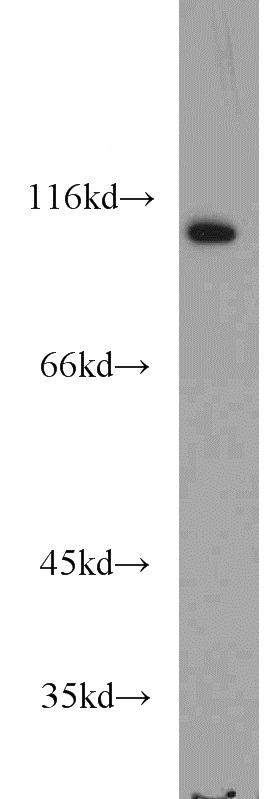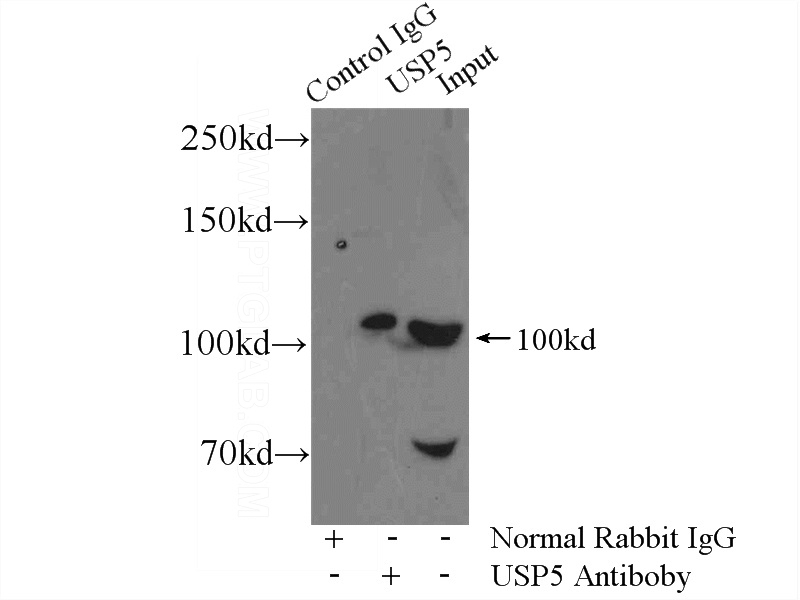-
Product Name
USP5 antibody
- Documents
-
Description
USP5 Rabbit Polyclonal antibody. Positive WB detected in A549 cells, DU 145 cells, human colon tissue, human heart tissue, MDA-MB-453s cells, mouse brain tissue. Positive IP detected in mouse brain tissue. Observed molecular weight by Western-blot: 96-100 kDa
-
Tested applications
ELISA, WB, IP
-
Species reactivity
Human,Mouse,Rat; other species not tested.
-
Alternative names
Deubiquitinating enzyme 5 antibody; Isopeptidase T antibody; ISOT antibody; Ubiquitin thiolesterase 5 antibody; USP5 antibody
-
Isotype
Rabbit IgG
-
Preparation
This antibody was obtained by immunization of USP5 recombinant protein (Accession Number: NM_003481). Purification method: Antigen affinity purified.
-
Clonality
Polyclonal
-
Formulation
PBS with 0.1% sodium azide and 50% glycerol pH 7.3.
-
Storage instructions
Store at -20℃. DO NOT ALIQUOT
-
Applications
Recommended Dilution:
WB: 1:500-1:5000
IP: 1:500-1:5000
-
Validations

A549 cells were subjected to SDS PAGE followed by western blot with Catalog No:116689(USP5 antibody) at dilution of 1:1000

IP Result of anti-USP5 (IP:Catalog No:116689, 4ug; Detection:Catalog No:116689 1:1000) with mouse brain tissue lysate 4000ug.
-
Background
USP5, also named as ISOT, belongs to the peptidase C19 family. Knock-down of USP5 causes the accumulation of TP53/p53 and an increase in TP53/p53 transcriptional activity because the unanchored polyubiquitin that accumulates is able to compete with ubiquitinated TP53/p53 but not with MDM2 for proteasomal recognition. USP5 is a potential target for p53 activating therapeutic agents for the treatment of cancer(PMID: 19098288). It is a novel proteasome associated protein(PMID: 19182904). USP5 cleaves linear and branched multiubiquitin polymers with a marked preference for branched polymers.
-
References
- Dayal S, Sparks A, Jacob J, Allende-Vega N, Lane DP, Saville MK. Suppression of the deubiquitinating enzyme USP5 causes the accumulation of unanchored polyubiquitin and the activation of p53. The Journal of biological chemistry. 284(8):5030-41. 2009.
- Besche HC, Haas W, Gygi SP, Goldberg AL. Isolation of mammalian 26S proteasomes and p97/VCP complexes using the ubiquitin-like domain from HHR23B reveals novel proteasome-associated proteins. Biochemistry. 48(11):2538-49. 2009.
- Nakajima S, Lan L, Wei L. Ubiquitin-specific protease 5 is required for the efficient repair of DNA double-strand breaks. PloS one. 9(1):e84899. 2014.
- Turanov AA, Shchedrina VA, Everley RA. Selenoprotein S is involved in maintenance and transport of multiprotein complexes. The Biochemical journal. 462(3):555-65. 2014.
- Song AX, Yang H, Gao YG, Zhou CJ, Zhang YH, Hu HY. A ubiquitin shuttle DC-UbP/UBTD2 reconciles protein ubiquitination and deubiquitination via linking UbE1 and USP5 enzymes. PloS one. 9(9):e107509. 2014.
- there was a problem with your PMID, try again.
- Gadotti VM, Caballero AG, Berger ND. Small organic molecule disruptors of Cav3.2 - USP5 interactions reverse inflammatory and neuropathic pain. Molecular pain. 11:12. 2015.
Related Products / Services
Please note: All products are "FOR RESEARCH USE ONLY AND ARE NOT INTENDED FOR DIAGNOSTIC OR THERAPEUTIC USE"
